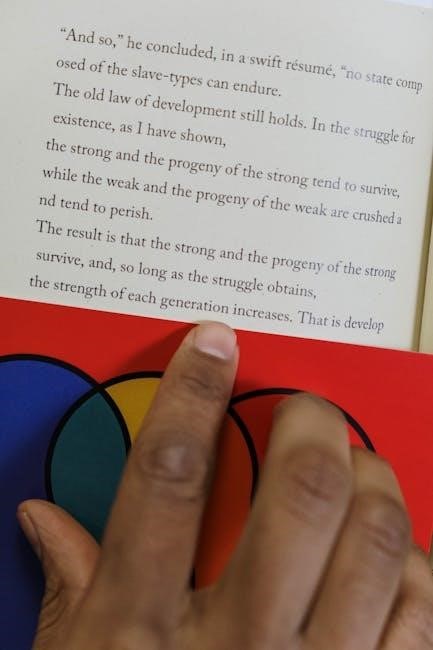Year 7 reading comprehension focuses on developing skills to understand and interpret texts effectively․ Students learn to identify main ideas, make inferences, and analyze details․
1․1 Importance of Reading Comprehension Skills
Reading comprehension skills are essential for Year 7 students as they form the foundation for academic success․ These skills enable students to understand complex texts, identify key details, and make meaningful connections․ Strong comprehension fosters critical thinking, effective communication, and the ability to analyze information, preparing students for future challenges in education and beyond․
1․2 Overview of Year 7 Reading Curriculum
The Year 7 reading curriculum is designed to enhance students’ ability to interpret and analyze various texts․ It focuses on core skills such as identifying main ideas, making inferences, and understanding vocabulary in context․ Students engage with fiction and non-fiction passages, fostering critical thinking and deeper comprehension․ The curriculum also incorporates digital tools and resources, including PDF worksheets and interactive activities, to support learning․

Key Strategies for Improving Reading Comprehension
Effective strategies include identifying main ideas, making inferences, and understanding vocabulary․ These techniques help students engage deeply with texts and improve their overall comprehension skills․

2․1 Identifying the Main Idea and Supporting Details
Identifying the main idea and supporting details is crucial for Year 7 reading comprehension․ Students learn to recognize the central theme of a passage and distinguish it from supporting details․ This skill enhances their ability to summarize texts accurately and understand how ideas are interconnected․ Worksheets and exercises often include passages followed by questions that test this ability, ensuring mastery of this fundamental skill․
2․2 Making Inferences and Drawing Conclusions
Making inferences and drawing conclusions are advanced reading skills for Year 7 students․ They involve using evidence from the text to form opinions or predictions․ Exercises often include questions that prompt students to think beyond the literal meaning of a passage․ These skills are essential for deeper understanding and critical thinking, enabling students to engage more fully with complex texts and themes․
2․3 Understanding Vocabulary in Context
Understanding vocabulary in context is a key skill for Year 7 reading comprehension․ Students learn to determine word meanings by analyzing surrounding text, such as context clues like synonyms, antonyms, or definitions within sentences․ This skill enhances comprehension and enables students to interpret complex texts more effectively․ Worksheets and PDF resources often include exercises to practice identifying and using context clues․

Recommended Resources for Year 7 Reading Comprehension
Free worksheets, PDF materials, and interactive activities are widely available to support Year 7 reading skills․ Resources like “Year 7 Comprehension-booklet․pdf” offer engaging exercises for practice․
3․1 Free Worksheets and PDF Materials
Numerous free worksheets and PDF materials are available online to enhance Year 7 reading comprehension skills․ Resources like “Year 7 Comprehension-booklet․pdf” offer engaging passages and questions․ Educators create these materials to cover various skills, including identifying main ideas, making inferences, and understanding vocabulary․ They are easily accessible, printable, and editable, making them ideal for both classroom and home use․ These tools are designed to cater to different learning needs and promote effective reading practice․
3․2 Interactive Activities and Online Tools
Interactive activities and online tools provide engaging ways for Year 7 students to enhance reading comprehension․ Platforms like “Rapid Reading Comprehension: World of Spies” and “Sweet Dreams KS3 Reading Comprehension” offer interactive exercises․ These tools feature multiple-choice questions, progress tracking, and immediate feedback, making learning dynamic and effective․ They cater to diverse learning styles and help students improve their skills in a fun and accessible manner․

Common Skills Assessed in Year 7 Reading Comprehension
Year 7 reading comprehension assessments focus on literal and inferential understanding, analyzing characters, settings, and themes․ Students must provide evidence-based answers and demonstrate deep text analysis skills․
4․1 Literal and Inferential Questioning Techniques
Literal questions test explicit details from the text, while inferential questions require readers to make connections and draw conclusions․ Both skills are essential for understanding complex texts and demonstrating comprehension․ Students are often assessed through multiple-choice questions and open-response formats, ensuring they can identify main ideas and support their answers with evidence from the passage․
4․2 Analyzing Characters, Settings, and Themes
Students learn to identify character traits, understand settings, and recognize themes in texts․ Analyzing these elements helps readers comprehend the plot and the author’s message․ Exercises often involve identifying evidence from the text to support their interpretations, enhancing their ability to engage deeply with the material and understand its underlying meanings․
Engaging Activities to Enhance Reading Comprehension
Engaging activities like group discussions, creative writing tasks, and interactive exercises encourage students to participate actively, fostering critical thinking and collaboration while improving comprehension skills effectively․
5․1 Group Discussions and Peer-to-Peer Learning
Group discussions and peer-to-peer learning foster collaborative environments where students share insights and interpretations․ These activities encourage critical thinking and teamwork, helping students explain their understanding and learn from others․ Interactive reading exercises promote engagement and deeper comprehension, while group work builds confidence and communication skills essential for academic success․
5․2 Creative Writing Tasks Based on Comprehension Passages
Creative writing tasks based on comprehension passages allow students to express their understanding through narratives, dialogues, or poetry․ These exercises enhance critical thinking and imagination, enabling students to connect with the material personally․ By writing creatively, students develop analytical skills and gain confidence in articulating their ideas clearly and effectively․ This approach makes learning engaging and meaningful․

Assessing Progress in Reading Comprehension
Assessments include worksheets, online tests, and marking schemes to track progress․ These tools help identify strengths and areas needing improvement, fostering growth in comprehension skills effectively․
6․1 Types of Assessments and Marking Schemes
Assessments for Year 7 reading comprehension include multiple-choice questions, open-response tasks, and passage-based exercises․ Marking schemes focus on accuracy, understanding, and evidence-based answers․ Worksheets and online tests are commonly used, with clear criteria to evaluate literal and inferential skills․ Rubrics often highlight key areas for improvement, ensuring comprehensive feedback for students․
6․2 Using Feedback to Improve Reading Skills
Feedback is essential for refining reading comprehension abilities․ Teachers provide detailed comments on student answers, highlighting strengths and areas for improvement․ This guidance helps students understand their mistakes and develop targeted strategies․ Regular feedback also encourages reflection and growth, enabling learners to track progress and stay motivated in enhancing their reading skills effectively․
Integrating Technology into Reading Comprehension
Technology enhances Year 7 reading comprehension through interactive digital exercises and online platforms, offering engaging ways to practice and assess skills effectively․
7․1 Digital Tools for Interactive Reading Exercises
Digital tools like online reading platforms, interactive PDFs, and apps provide engaging ways to practice comprehension․ Kahoot and Quizlet offer quizzes, while Google Docs enables collaborative reading exercises․ These tools enhance learning by offering real-time feedback, multimedia content, and interactive features that make reading comprehension dynamic and accessible for Year 7 students․
7․2 Online Platforms for Practice and Assessment
Online platforms such as Reading A-Z and Khan Academy Kids provide comprehensive resources for Year 7 reading comprehension․ They offer interactive exercises, graded assessments, and progress tracking․ These platforms cater to diverse learning needs, ensuring students can practice and improve their skills independently․ Teachers can also use them to assign and monitor reading tasks effectively․

Role of Parents and Guardians in Supporting Reading Comprehension
Parents and guardians play a vital role by encouraging daily reading and discussing texts with their children․ This fosters a deeper understanding and love for learning․
8․1 Encouraging Regular Reading Habits
Parents can foster regular reading habits by creating a cozy reading environment and setting aside dedicated time each day․ They should discuss books with their child, exploring thoughts and opinions, and provide access to diverse materials, including PDFs and online resources, to keep learning engaging and consistent, ensuring steady progress in comprehension skills․
8․2 Providing Additional Resources and Guidance
Parents and guardians can support Year 7 students by providing access to free worksheets, PDF materials, and online platforms․ These resources, available for download, offer targeted practice in reading comprehension․ Encouraging the use of interactive tools and guided reading activities can enhance understanding․ Regular discussions about the content and offering feedback help reinforce learning, ensuring students feel confident in their ability to analyze and interpret texts effectively․
Mastering Year 7 reading comprehension is a milestone, preparing students for more complex texts․ Setting goals and practising regularly ensures continued progress and readiness for future challenges․
9․1 Setting Goals for Continued Improvement
Setting specific, achievable goals helps Year 7 students enhance their reading comprehension․ Regular practice with diverse texts and targeted exercises fosters improvement․ Teachers and parents can guide students in creating personalized learning plans, ensuring steady progress and a deeper understanding of complex materials․ Consistent effort and feedback are key to advancing reading skills effectively․
9․2 Preparing for Higher-Level Reading Challenges
Year 7 students can prepare for advanced reading by engaging with complex texts and diverse genres․ Practicing inferential questioning and analyzing themes builds critical thinking․ Utilizing online resources and structured worksheets helps reinforce comprehension skills, ensuring a smooth transition to higher-level challenges in future academic years․ Regular practice and exposure to varied materials are essential for long-term success․

Leave a Reply
You must be logged in to post a comment.